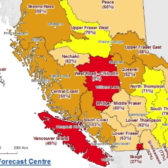Frozen Electricity Rates Are Thawing
An electricity rate freeze matters and so does the way a government minister tries to proclaim it.
Michelle Mungall, Nelson-Creston NDP MLA and Minister of Energy, Mines and Petroleum Resources, discovered this recently in the BC Legislature.
For BC Hydrocustomers who have endured a 58.81% increase in their power charges since 2009, the rate freeze announced November 8 at 12:48 p.m.by Mungall was undoubtedly a breath of fresh air.
Mungall said the provincial government was “delivering on its promise to freeze BC Hydro rates, putting an end to the years of spiralling electricity costs that have made life less affordable for B.C. homeowners and renters.” She told reporters the freeze would save ratepayers $150 million.
But mere hours later, under intense questioning in the legislature by Liberal MLAs Tracy Redies and Mike Bernier as well as Green Party leader Andrew Weaver, Mungall had to admit that the rate freeze may evaporate and not take effect on April 1, 2018 as planned.
The three opposition MLAs then accused Mungall of issuing a misleading news release.
And a day earlier during an estimates debate Mungall acknowledged that BC Hydro rates may increase by 10% if the utility is denied approval for the Site C dam and is on the hook for shut down and rehabilitation costs, possibly totalling $4 billion.
Mungall conceded to the Legislature that it is the BC Utilities Commission that will decide if it will approve a revamped BC Hydro application for a zero percent rate increase for 2018. The utility had previously asked the BCUC for a three percent increase next year.
The House Blues, a draft transcript of the debates of the Legislative Assembly, tell a story of a minister under siege.
“I’m now very confused,” Redies states. “The minister and her government just announced today a rate freeze. But I think, based on her answer, she’s saying it may or may not happen because the BCUC might decide it’s not appropriate. Is that correct? Is there a rate freeze or isn’t there?”
“There is going to be an application for a rate freeze before the B.C. Utilities Commission,” Mungall replies.
News release called “misleading”
“I’m just confused as to why the minister would go out with a public press release announcing this rate freeze, when she didn’t know whether or not it was going to actually happen. Isn’t that a bit misleading for the public?” Redies asks.
Weaver then stands up and reads the entire news release word for word to the House.
“It says nothing about approaching BCUC,” Weaver says. “It’s very clear, and I concur with the member opposite. I feel that this is quite misleading. I would like the minister to please clarify why the press release says, on the one hand, there’s a rate freeze, and now here today we understand that there’s not really a rate freeze but an application for a rate freeze.”
“I am sorry that he finds it misleading,” Mungall rejoins. “I personally am curious as to how he does. I mean, it seemed to be really clear to me.”
Redies then asks what Mungall plans to tell British Columbians if the BCUC refuses the zero percent increase.
“That’s a fair question, absolutely, and we’ll cross that bridge when we come to it,” Mungall replies.
Bernier asks Mungall if she was prejudging the outcome of the BCUC review which Mungall then denies.
“Can the minister, then, clear the air in the sense of letting the public know and letting this House know: was it an accurate comment for her to make to say that the taxpayers are now saving $150 million?” Bernier asks. “Or was it more of a fair comment to say they’re waiting to see if the Utilities Commission approves their application? At which point, if approved, they might be saving money.”
“I’m sure the member meant this, but just in case, and for the people who might be watching at home, the savings of $150 million would be felt by ratepayers, not taxpayers,” Mungall says, getting a dig in at Bernier.
Bernier persists and asks if Mungall will retract her press release.
Agree to disagree
“We’re going to have to agree to disagree here,” Mungall says. “I feel very, very solidly that our press release, everything I’ve said to media and everything I’ve said in this House has been consistent. There is no inconsistency, from my perspective.”
Weaver then enters the debate again.
“I’m really troubled by the line of questioning here, and I’m really troubled by what’s being revealed,” says Weaver. “This is a surprise that we are not actually freezing rates, but we’re going to the BCUC to ask them whether they will give us permission to freeze rates. We’re not going to influence them, on the one hand, because we respect the independence of the BCUC, but on the other hand, we’re saying that we’re saving $150 million. You can’t have it both ways.”
Weaver continues: “So I would like to reiterate the concerns expressed by the member for Surrey–White Rock and the member for Peace River South and suggest, in emphatic terms, that I believe the minister owes British Columbians a formal correction in a press release. I will ask: will she be willing to do that in response to the line of questioning that we have seen here today?”
Again Mungall uses the “agree to disagree” argument in defense of her department’s news release wording.
Weaver offers a rewrite of the release.
“The press release should have said this, “B.C. government will seek the ability from BCUC to freeze rates,” not “B.C. government will freeze rates.” But they said, “B.C. government will freeze rates,” and that’s simply not correct. There’s no other interpretation here,” he states.
Weaver adds: “Sometimes it’s okay to admit that you’ve made an error, but it is not okay to double down in defence of something that is clearly wrong. Again, to the minister: will she correct this publicly? It is misleading, and people across British Columbia think that their rates are going to freeze in April 2018, when they’re not. They’re not going to freeze unless the BCUC says they will.”
Mungall then seeks to bring the debate to an end.
“We’ve been canvassing this issue for about just over 45 minutes now,” she says. “I haven’t offered any new information or anything different, and I think we’ve come to the conclusion that this government and members opposite are just going to have to agree to disagree in terms of the wording of a press release.”
BC Hydro mired in debt
But a badly worded news release and the possible scramble to find a way to make up $150 million in lost revenue is only the tip of the iceberg that engulfs BC Hydro.
Government intervention to quell surging domestic energy bills may be temporary good news for the ratepayer but not for a directionless utility mired in debt.
In 2013, former BC Hydro CEO Charles Reid confirmed that in total the corporation owed almost $70 billion: $15 billion in long term debt, $4.5 billion in deferral accounts, and some $50 billion in future contractual obligations.
In an exclusive in the March 1, 2016 Watershed Sentinel, energy researcher Arthur Caldicott detailed BC Hydro’s now $76 billion debt. By March 2017, former provincial MLA Rafe Mair accused the Liberal government of increasing BC Hydro’s real debt in constant dollars by “1,337% from $6 billion in 2005 to $80.2 billion today”.
Someday the mountain of debt must be repaid.
BC Hydro finances “among the weakest”
In January this year, Moody’s Investors Service said BC Hydro’s finances are “among the weakest of Canadian provincial utilities” and its rising debt level is a risk to the province’s credit rating.
Richard McCandless, a retired B.C. government senior manager, detailed in a March 2017 Policy Options article the rate-regulated deferral accounting method that the former Liberal government has allowed BC Hydro to follow for years.
After its re-election in 2013, the Liberal government announced a new 10-year financial plan for BC Hydro and sent a detailed cabinet directive to the BCUC that took all discretion away from the regulator, McCandless wrote.
“The directive also created a new ‘rate smoothing’ deferral account that allowed BC Hydro to record revenues that it may collect in future years. This dubious accounting device allowed the government to claim that BC Hydro was still profitable. It recorded additional revenue on its books for 2014/15 and 2015/16, and it sent $590 million in dividends to the government that would not have been paid out under normal circumstances. Because BC Hydro did not actually receive the revenue, it had to increase its borrowing requirements by an equivalent amount in those years to pay the dividend.”
McCandless concluded that “the BC government has found a way to manipulate the accounting rules to hide the true cost of electricity from the public and load the difference onto the debt burden faced by future generations of customers.”
BC Hydro ratepayers may find intolerable the kind of rate increases that will be required to pay off the corporation’s debt and it is not justifiable to force future generations of ratepayers to pay for mistakes BC Hydro made before they came of age.
In all likelihood, the debt will eventually be repaid by all B.C. taxpayers.
Utility business model flawed
Electric utilities have operated for decades on the unsustainable premise that selling more electricity every year is better. It is a business model that is deeply flawed.
In the 1970s, then- BC Hydro chairman Robert Bonner urged everyone to leave their lights on overnight as it would discourage burglars.
As a public monopoly, BC Hydro is incentivized to be reactive – rather than proactive – in encouraging energy efficiency, energy storage and renewable sources of electricity other than hydro. It began its Power Smart energy conservation program in 1992, more than 15 years after U.S. utilities began such programs.
Furthermore, it traps customers to be entirely reliant on a single company. FortisBC buys power from BC Hydro and Nelson Hydro purchases extra power from FortisBC so what happens at BC Hydro has a ripple effect on local utilities.
A rapid movement is occurring away from the decades-old system of generating electricity from large, centralized power plants and distributing it to customers over an interconnected grid. This is giving way to a new, decentralized structure that features varying types of distributed energy resources (DERs), most notably rooftop solar, and including wind and geothermal.
In utility parlance, DER is “disruptive” and along with energy efficiency measures and renewable energies is slowing electricity load growth. This could ultimately spell the death knell for utilities that have historically made money based on the volume of electricity they sell.
Eventually utilities like BC Hydro will be forced to adopt a non-profit business model and revert to a “cost-of-service”’ model to recover costs. They can then choose to become an electric co-op or a non-profit corporation if they are to have a stable future.
Hydro rates politicized
There is a thin line between using electricity and abusing electricity. The same statement can be made regarding political power.
For far too long, governments in B.C. have politicized electricity rates, hiding the true cost of electricity from the public.
The question of whether the BC Utilities Commission will agree to keep BC Hydro rates “affordable” and consent to a rate “freeze” is the least of the worries of B.C.’s new NDP government and its rookie Energy Minister.
Mungall said in her news release the government will “undertake a comprehensive review of BC Hydro. That review will identify changes and cost savings to keep rates low while ensuring BC Hydro has the resources it needs to continue to provide clean, safe and reliable electricity.”
The “thaw” created by that review could lead to the disintegration of BC Hydro as we currently know it.
It remains to be seen whether the ratepayers can live with the consequences.
Michael Jessen is an ecowriter and energy consultant residing at Longbeach near Balfour, BC. He can be reached by email @ zerowaste@shaw.ca

























